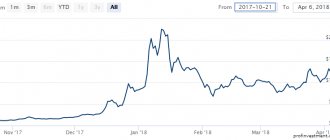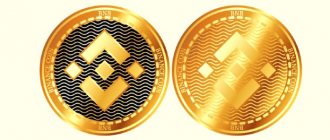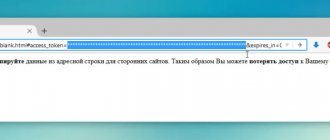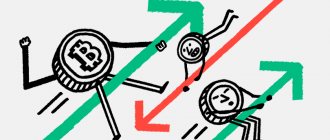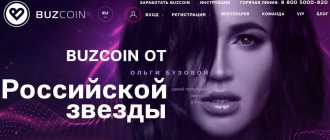Everyone knows what types of cryptocurrencies and how they differ from the ruble. But not everyone understands what a token is and how it differs from cryptocurrency.
And if buying bitcoins and putting together your own mining farm is risky and expensive, then investing in a couple of ICOs is inexpensive and simple, although no less risky.
I will tell you what a token is, why you should buy it, and what to do with it later.
What are digital tokens in the cryptocurrency market?
Recently, you can increasingly come across the term ICO (Initial Coin Offering), which literally translates as “initial coin issue.” At its core, an ICO is a tool for raising capital by involving investors in a startup related to the development/promotion of any technology/platform/service with cryptocurrency. Direct capital raising is carried out through the preliminary sale of tokens at a price set by the organizer.
Digital tokens are virtual “coin substitutes” sold at ICOs. Subsequently, the tokens can be exchanged for new cryptocoins.
In simple words, a cryptocurrency ICO is a preliminary sale of cryptocurrency at a price that is expected to increase significantly in the future.
Thus, the company issues a certain number of crypto tokens and then sells them to the target audience, most often for bitcoins or fiat money. As a result, users transfer bitcoins, and in return receive a new cryptocurrency, which in the future will help them get some profit from the startup.
Fundraising for ICOs is carried out using “smart contracts”. In the vast majority of cases, smart contracts generate ERC20 tokens on the Ethereum blockchain. The use of blockchain in the project is not necessary, since its main purpose is the generation and storage of tokens.
I discussed it in more detail in the article: What are Tokens?
Adaptation of tokens to the existing legal space
The authors see four different approaches to conducting a legal token pre-sale.
Swiss GmbH (LLC) and Stiftung (Foundation)
The Ether pre-sale was conducted by the Ethereum Foundation, a non-profit organization registered in Switzerland. The only declared goal of the Foundation is to manage the proceeds from the sale of ether and develop the Ethereum ecosystem. To allow US citizens to purchase ether without SEC permission, the Foundation framed the pre-sale of ether (ETH) as a sale of “cryptofuel” necessary to run applications developed on the Ethereum platform.
The development of the program code was carried out by Ethereum Switzerland GmbH, a company based in Switzerland.
Singapore company and DAO
In the case of Digix, the smart contract for DigixDAO was written by DigixGlobal, a company registered in Singapore. This company worked under contract with DigixDAO and received payment for the development of the Digix network.
Share tokens are analogous to shares in DigixDAO. The Singapore Financial Commission does not consider tokens to be securities, but the legal sale of tokens to US citizens is subject to the SEC's decision under the Howey test.
CODE - conditional decentralization
The third experimental approach is using Singular-DTV, a blockchain-based entertainment studio. CODE is an abbreviation, a combination of two elements:
CO (Central Organized) – management component in the form of a Swiss GmbH
DE (Decentralized Entity) is a decentralized ecosystem based on the Ethereum network.
GmbH is responsible for spending the ether collected during the pre-sale of tokens through DE. The goal of the project is to create media projects and collect income from them. The CODE model is expected to satisfy regulatory and tax laws while protecting token holders from potential liability.
Independent company
The emission of tokens and network support occur independently of the creator of the system. Tokens are issued through a computer algorithm in which there is no public key to receive the proceeds. The creator of the system receives his share of tokens from mining, since he is the first miner in the finished network. This approach is used by the Steemit network and its creator, Delaware C Corp.
The listed methods of building new companies are only the first attempts to incorporate new models into existing legislation. As new projects, lawyers and regulators enter the crypto space, new rules of the game will be developed.
Types of ICO digital tokens
- Equity tokens represent company shares.
- Utility tokens - reflect some value within the business model of the online platform (reputation, points for certain actions, game currency).
- Asset-backed tokens are digital obligations for real goods or services (kilograms of carrots, an hour of work for a builder, etc.).
Application tokens (appcoins)
The main purpose of application tokens is to pay for internal network services of a specific project. Their presence allows the user to gain access to additional functions and opportunities in the decentralized network.
It should be noted that such tokens and cryptocurrency are two different things. For example, users of the Steemit network receive tokens for posting content, popularizing or creating new features. In this case, the token is a referral reward.
In the Bitcoin and Ethereum ecosystem, they can only be obtained through mining. Most of the tokens appear on the network, thus they can be freely purchased, sold and exchanged for other cryptocurrencies. It is also important that their circulation is usually regulated by the main protocol, but unlike digital currencies, not so strictly.
Credit tokens
One of the main functions of electronic tokens is to invest regular money (dollars, euros, yuan, etc.) in new projects that demonstrate a high liquidity ratio.
For example, by purchasing Steem Dollar (SD) credit tokens, you can expect a return of 10% per annum on the total loan amount. Moreover, payments, according to the conditions, are made in SD, despite the fact that user payments are mainly made in fiat money.
Thus, the Steemit blockchain system receives funds for its development, and users receive income. For such a business model, the availability of electronic tokens and their circulation is a defining moment.
Share tokens
As you can see in the section on ICO projects, almost every day we learn about new startups that attract funding by issuing their own tokens, which are purchased by anyone who is interested in the project.
A logical question arises: why not create a new cryptocurrency right away? The fact is that startup initiators do not have the opportunity to wait a certain time for a new digital currency to strengthen its position in the market.
Despite the fact that this model is quite new and not fully regulated, it has been able to demonstrate its effectiveness, which is constantly increasing its popularity. In this case, tokens can be considered as an analogue of shares, but do not provide subsequent income to their owners.
In rare cases, electronic tokens provide a stake in the business and voting rights to holders when considering project development initiatives.
Can I conduct an ICO?
Yes. Anyone can conduct their own ICO and find funding for their idea.
But, at a minimum, you will need to create a decent website, detail your idea and plan for its development in a whitepaper, create an ecosystem - choose a blockchain, issue a token, etc.
Moreover, you will have to compete with many other projects and prove the viability of your startup every day.
You can also go the fraudulent route : collect money and “wash your hands of it.” Moreover, the legislative regulation of ICOs is very weak. But no one has yet canceled the “laws of karma”.
Pre-sale of tokens within the ICO
An ICO or public token sale stage is launched so that a company can receive money in the tokens of their system from independent investors. In this case, the token acts as a contract under which the owner of the tokens will be provided with something in return - a product or service.
An investor buys, for cryptocurrency or regular money, the right to receive predetermined goods/services/bonuses within a specific company. Which ones exactly depends on what the startup offers.
The dynamics of development and economic strategy associated with the sale of tokens are growing every day. Cryptocurrency networks can easily combine different types of tokens. In this matter, legislation plays a big role, or, more precisely, its absence in relation to the issue and sale of tokens.
This type of activity does not yet fall under any jurisdiction. Even the process of selling tokens in some sense contradicts the main Bitcoin protocol, but it is still popular because significantly expands the possibilities for the fruitful development of a decentralized payment system.
This is especially useful at the initial stage of a new startup or project. Many players in the cryptocurrency market consider all the risks associated with tokens to be completely justified, given that the original structure of cryptocurrencies has long lacked flexibility.
ICO exit process
If you have an idea and need money to implement it, then it’s time to conduct an ICO. Project implementation stages:
- Presentation . You can announce the idea through online publications, social networks or by holding a conference. You need to tell the crypto community about your plans. This will help determine the depth of interest of potential investors in financing the project.
- Publication of the offer . Only a company can make a proposal for cooperation. We will have to indicate the timing of the launch of the blockchain network, the size of the investment, and the number of tokens issued. At a closed sale, you can raise money to start a project.
- Advertising campaign . During the presentation of the final product, you can reveal technical details, talk about the benefits that its use will bring, and publish the conditions for purchasing tokens. Access to ICO can be done through analytical platforms (Icobench, Neironix). Potential investors are often present here.
- Start of sales . Trading can take place within the network or on cryptocurrency exchanges.
A team of qualified specialists with a delimited area of responsibility will help you achieve success. We cannot do without the support of advisors. You can hire private consultants. You will also need a general description of the project (White Paper) and a business plan.
Where and how to buy cryptocurrency tokens:
Tokens are traded on various cryptocurrency exchanges and you can buy them there. They are pegged to the euro and thus can be purchased with money. And then convert the cryptocurrency itself into real euros.
The very type of token dictates its distribution mechanism (crowdsale).
You can also purchase coins (cryptocurrency coins) from the miners themselves.
Exchanges
To purchase tokens, you can use any exchanges and exchangers. It is only important to choose a proven resource. If you don't want to trust sites, you can use the personal transactions feature. In this case, you will need to set the price of tokens directly with the seller. In basic terms, token trading is no different from similar processes with digital currency.
You can often find resources that provide the ability to purchase tokens using traditional payment systems. If a token gets listed on the exchange, this is already a sign that it has been recognized by the public, in fact, as it confirms the prospects of the project itself. If you yourself cannot decide whether a particular project will be successful, pay attention to specialized resources that regularly monitor ICO projects, updating information about them and giving advice to beginners.
Related articles: Review of cryptocurrency exchanges How to buy/exchange cryptocurrency
ICO
The most important stage in purchasing tokens from new startups at ICO is the competent choice of a project that will bring tangible profits to its owners and investors in the future. You can view upcoming ICO projects on our website.
When choosing an ICO, you need to carefully study the idea, find out who the organizer is, and whether these people have expertise in the field of cryptocurrencies and related technologies. It is extremely important to analyze how viable and applicable the project that the organizers want to implement is. Otherwise, the chosen project may turn out to be unprofitable, which will only lead to a completely meaningless loss of funds.
To purchase tokens within the ICO you must:
- choose a suitable startup;
- go to the official website of the project;
- go to the “Join the sale” section;
- select the required currency; read the license agreement;
- enter the address of the cryptocurrency wallet from which payment will be made;
- indicate the address to which the payment will be made;
- using a cryptocurrency wallet, transfer currency to the recipient’s address to purchase tokens;
- wait for the transaction to complete; check your wallet account.
Which exchange to buy EOS tokens on?
You can purchase EOS tokens on many exchanges, including:
- Yobit - Yobit Review;
- Bitfinex - Review of the Bitfinex exchange;
- Kraken - Kraken Review;
- HitBTC - Review of the HitBTC cryptocurrency exchange.
Experts strongly recommend that before purchasing tokens, you analyze the dynamics of changes in the EOS exchange rate, otherwise the purchase may turn out to be completely unprofitable.
Where to find projects: ICO trackers
To find promising blockchain projects, investors use special trackers. These are online platforms where information about startups that are conducting or have already completed an ICO is posted. With the help of such resources, crypto enthusiasts can easily track startups and choose the most interesting options to participate.
The trackers contain a minimum set of information about the project: the name and logo of the company, the start date of the crowdsale. Additional information may include the amount of investment, information about the team, links to social networks, forums, project documentation, including a white paper. By learning this information, investors will be better protected from fraud.
The most popular English-language trackers are:
- Happy Coin Club;
- CoinGecko;
- The Cointelegraph;
- ICO Alert;
- CoinSchedule.
The most famous Russian-language trackers are:
- ICO-tracker;
- Rating ICO;
- Kibers;
- ICO Time;
- ICO-stat.
Blockchain startups actively use trackers to reach their target audience. For startups, this is an additional tool for promoting and attracting the attention of the crypto community.
What to do with tokens after ICO?
The growing interest in ICOs is explained by truly unique opportunities for startups, so today the benefits of issuing tokens are known to everyone. In this regard, a logical question arises: why should investors buy tokens and what to do with them after the ICO? The main reasons that can be explained for the purchase of tokens are:
- the opportunity to receive company services at a lower cost;
- personal interest of the investor in a specific project;
- and also the most common reason is obtaining financial benefits due to the resale of tokens in the future.
Regarding the possibility of receiving any services from the company, we immediately note that most often this represents the purchase of disk space, as well as the opportunity to increase the bandwidth of the channel (this is the service, for example, that investors of the Storjcoin X project receive).
The investor’s personal interest in the project can be explained by the desire to contribute to the development of some area, to participate in the creation of something useful for society. Purchasing tokens of a promising project opens up broad prospects for their profitable resale in the future (if, of course, their value increases) and generating income.
In order to better understand the opportunities that are available to token owners after the ICO, we list their main functions.
As you know, tokens can: be a reward for miners, act as a fee for using a certain system, represent a share in a project, or be a digital asset.
In addition, tokens can serve as a means of accounting and be used to prevent attacks. And, of course, we must not forget about one of their main functions: tokens also often act as currency and represent a means of payment between project participants.
What are they used for?
Tokens are the equivalent of valuable project assets in the crypto industry.
Main characteristics:
- Used as a means of payment in the internal system.
- Serve as a guarantor of confirmation of participation in the project.
- Demonstrate the share that the investor receives in the company.
- Acts as a specific indicator (the amount of GB available for download).
- Reward for specific user actions in digital format.
In simple words, a token is a multifunctional instrument that simultaneously performs the functions of a payment unit within a project and an indicator of the investor’s share. The main difference between a cryptocurrency and a token is the scale and range of use. The first is used for making payments and transactions, the second has more possibilities for application, but on a smaller scale.
This type of digital assets can be used as the basis for a bounty program or loyalty system. Tokens are used (at least at the start of the project) in intra-system operations of a closed ecosystem. They do not support an open wallet or blockchain like cryptocurrencies.
The principle of operation of tokens can be compared to chips in a casino, which are valuable only inside the gambling establishment, but are exchanged for real money when leaving. By analogy, when the ICO ends, the tokens are converted into cryptocurrency, acquiring real value.
The first ICO (crowdsale, token sale) - Mastercoin (now Omni) began at the end of 2013 and ended in 2014. The case gave impetus to the emergence of a huge number of other cryptocurrencies and blockchain projects.
Features that help you understand what tokens are in cryptocurrency:
- Most assets are based on the Ethereum platform. To simplify the creation procedure, the company provides open source code and the ERC-20 protocol. Other popular analogs: EOS, NEM and Waves.
- Purchasing an asset at the ICO stage involves purchasing private keys that provide access to information about the amount of assets.
- The rapid development of the cryptocurrency market has led to the popularization of tokens.
- The value of assets is subject to change. Price movement works according to the stock exchange principle. Investors receive dividends using purchased digital units to earn money.
- Some projects give out chips for free at the start. You can earn them by completing simple tasks (likes, reposts, comments) in the bounty program.
This type of digital assets is divided into different types.
How to make money on cryptocurrency tokens?
To try to make money on cryptocurrency tokens, you first need to buy or receive free tokens of the most promising project, and from the moment they enter the exchange, sell them profitably or receive interest on their ownership.
In this case, the principle is very similar to ordinary shares, but the indisputable advantage of tokens is their rapid rise in price after entering the stock exchange. While the shares of well-known largest companies remain at the same level for quite a long time, tokens can rise in price tenfold in just a couple of hours.
It is important to remember that ICO (Initial Coin Offerings) is an initial offering of a new coin with the goal of creating a new cryptocurrency.
These tokens are sold to raise funds for technical development before a new cryptocurrency is released. An ICO is somewhat similar to an IPO (initial public offering of shares of a company), but differs in that purchasing tokens does not give ownership rights in the company that is developing a new currency.
In addition, you need to understand that ICO projects do not always take off, and you always need to be prepared for this.
How many were there?
Last year there was a boom. According to CoinSchedule , there have been 235 ICOs in 2022, compared to only 46 startups in 2016.
At the same time, the amount of money raised increased 40 times and in 2022 it exceeded $3.7 billion.
Most of all, crypto investors believed in Filecoin, which promises to make global decentralized and free cloud data storage. Filecoin raised $257 million in ICO.
go
What is asset tokenization?
Tokenization is the process of transforming the accounting and management of assets, in which each asset is represented as a digital token.
The essence of tokenization is to create digital analogues for real values in order to quickly and safely work with them. For example, the owner of a bakery creates an electronic accounting system in which he issues digital obligations for baked goods - tokens.
Having a fairly good reputation, the owner of a bakery can pre-sell buns by selling tokens on trading platforms on the Internet. In this case, any token owner can come to the bakery and exchange one token for one loaf.
Mobox (MBOX)
Mobox is an NFT-based gaming platform powered by Binance Smart Chain that uses MBOX as its native coin. MOMOverse is a cross-platform metaverse where users can own in-game items using NFTs.
MBOX/USDT: Source: TradingView
The price of MBOX jumped 58% in the previous 24 hours, reaching $13.74. This is an increase of 115% over the previous week and 2,200% over the previous month. MBOX fell 8 percent, but is still 8 percent above the all-time high of $15.44 reached recently.
According to CoinMarketCap, the MOBOX price today is $5.18 and the 24-hour trading volume is $78,126,305. It fell 3.90% in the last 24 hours.
How is a token different from a cryptocurrency?
What is cryptocurrency? This is a unit of account in blockchain technology, where mining is used - the process of issuing (putting into circulation) cryptocurrency. It is used for sales, transaction fees, and is a store of value. Blockchain technology is the basis for the functioning of electronic money, the Bitcoin cryptocurrency and its similar coins.
I already wrote about this in the article: What is cryptocurrency?
Tokens – what are they? They represent a contract, receipt, promissory note with an obligation to provide the person who owns them with a service or product that is determined in advance. Their emission is carried out by a legal entity or individual who initiates their release, unlike cryptocurrency.
Transaction processing and acceptance can also be done centrally, with the organization controlling each server.
The cost of a token can be formed both from supply and demand, as well as from the rules of issue, reward, or linking to an external asset.
Presales and white papers
The process of attracting investors through ICO can be divided into several stages:
- The release of a whitepaper is a small, convincing guide, a powerful marketing tool that tells how a future project will work and what its benefits will be. A good “whitepaper,” as it is called in the crypto community, should contain all the necessary technical, commercial and financial details, while being easy to understand and concise.
- Pre-sale (Pre-ICO) - an initial sale or pre-sale, when cryptocurrency is available on more favorable terms - for example, with a 50% discount. The presale is necessary so that investors can assess the risks of the project. And a lower price should insure these risks.
- ICO – the cost of tokens becomes full, everyone can participate in their acquisition.
Where to store tokens?
In the transfer and storage processes, tokens are similar to other cryptocurrencies.
For this purpose, special wallet applications are used (online, desktop, mobile), which implement the storage and processing of keys, as well as the formation and signing of transactions. Typically, these applications are part of the tokenization platform infrastructure. It is also possible to store tokens on exchanges that support a specific cryptocurrency, but this is the least reliable option and is best avoided. Since there is always a risk of government intervention, which can lead to a complete stop of trading on a particular exchange and freezing of user accounts (disabling access to the account).
How it all began
The idea of tokenizing business projects did not appear yesterday.
Centuries ago, merchants minted tokens to finance trading expeditions. If the venture was successful, token holders received scarce goods for personal use or resale. But if the expedition failed (for example, the ship was attacked by pirates), the investment was burned.
During the Industrial Revolution in Britain, entrepreneurs and bankers minted their own coins to pay employees and partners.
Tokens have returned to the modern financial world thanks to blockchain. Essentially, the first token is Bitcoin. The infrastructure that is necessary for its operation is maintained by users in a decentralized manner. As a reward, they receive coins that can be sold on an exchange or used as a means of payment.
What are the benefits of tokenization?
- Speeds up trading processes, since there is no need to move real assets and prepare documents for property rights;
- Increases the security of storage and transmission by recording transactions based on blockchain technology;
- Removes the need to trust intermediaries, since their participation can be described at the smart contract level or they can be excluded from the chain;
- Increases the functionality of the infrastructure, expands the capabilities of the platform by connecting additional modules (multi-level authentication, creation of invoices, regular payments, replenishment cards);
- Improves usability because many of the platform's features can be integrated into the mobile app's user interface.
What are the risks and challenges of tokenization?
- In a system that tokenizes real assets, just like in other payment systems, there is a risk of collateral theft.
- There are also risks that the keys on which the tokens are stored may be stolen by hackers or lost. At the moment, there is no approach to assessing such risks and, accordingly, insuring them.
- Transaction privacy on public blockchains is a topic of intense debate. Decentralization of a system always leads to difficult scaling problems.
Attracting investments through ICO
Currently, ICOs are not regulated in any way by law, and it is definitely impossible to say whether it is legal to raise money for your project in this way. As well as calling the transactions being carried out illegal. Tokens are not officially recognized as money, so their purchase and sale are not controlled by law.
However, in the United States there are already attempts to control ICOs - tokens were recently declared securities. In the CIS countries, there have not yet been any official statements about the implementation of new bills regulating Initial Coin Offering. And on the one hand, this is good - any intervention by regulatory authorities will slow down the entire system, limiting opportunities for quick earnings.
On the other hand, ICO attracts scammers who create certain risks for investors.

